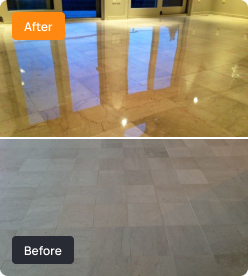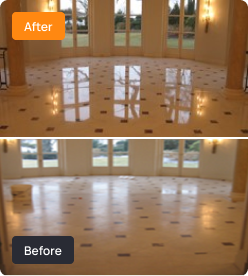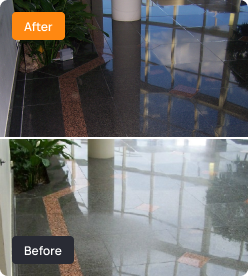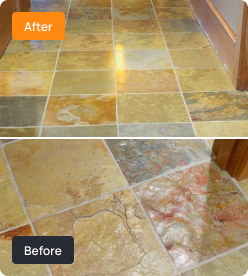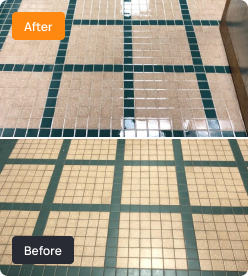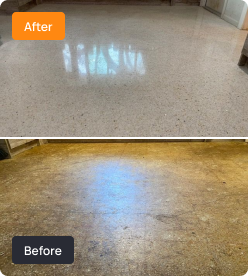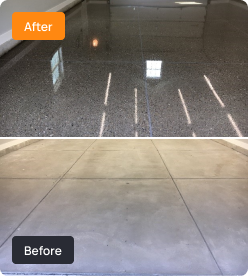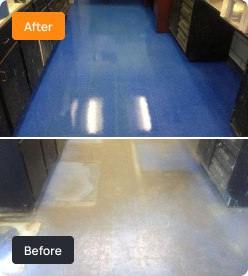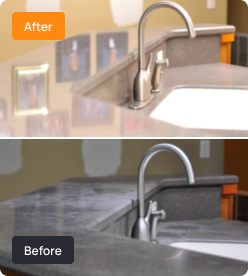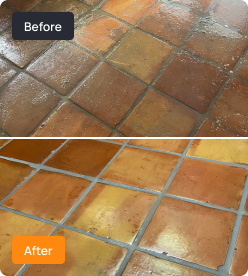Why Should You Think Twice Before DIY Cleaning Marble & Granite?
Marble and granite countertops, renowned for their durability and aesthetic appeal, are favored in kitchens and bathrooms. To preserve their pristine condition, they necessitate diligent maintenance. Regular cleaning plays a crucial role in averting stains and damage, and although numerous DIY cleaning solutions exist, they often fail to deliver optimal results. It is important to […]
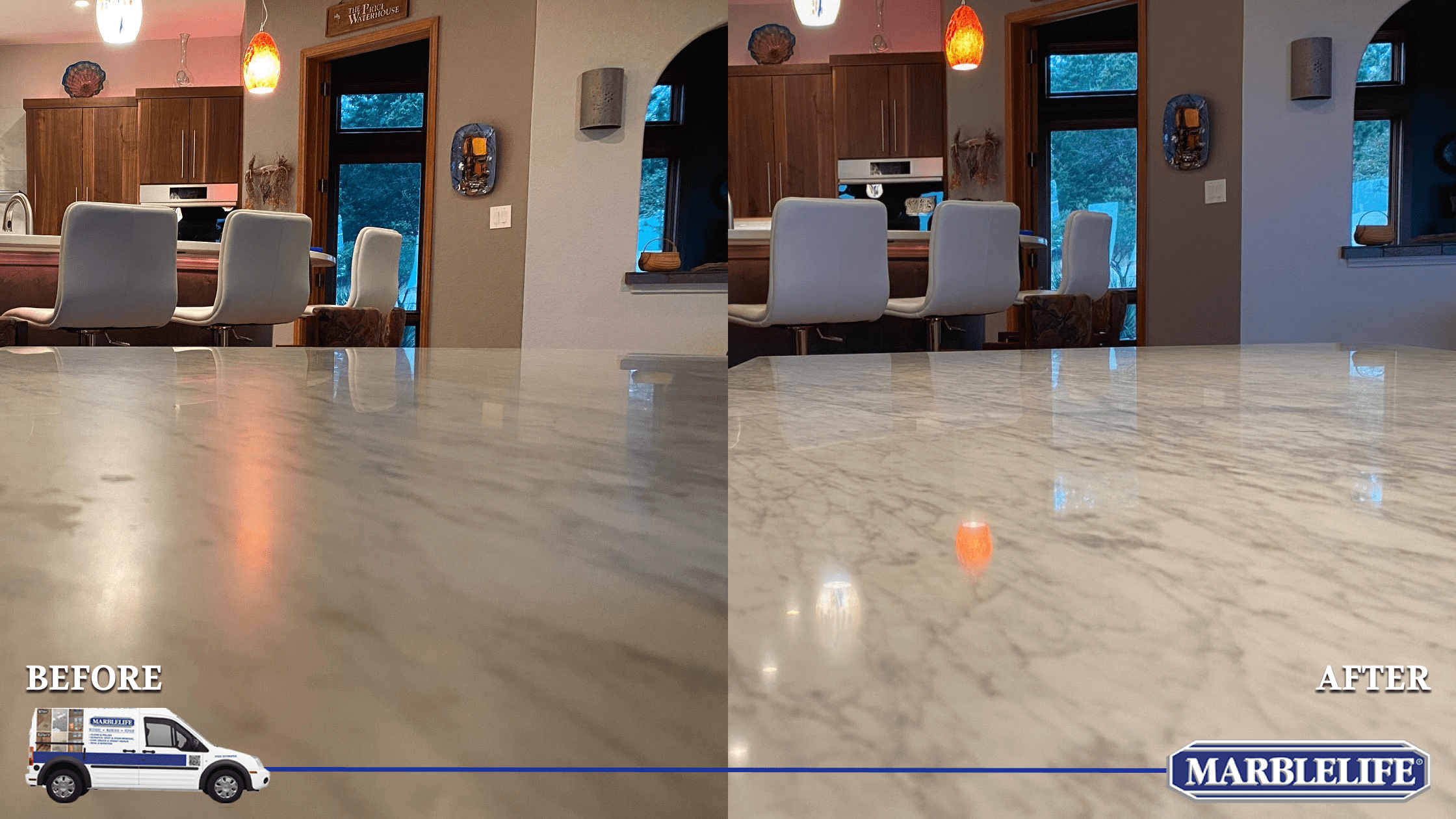

Marble and granite countertops, renowned for their durability and aesthetic appeal, are favored in kitchens and bathrooms. To preserve their pristine condition, they necessitate diligent maintenance. Regular cleaning plays a crucial role in averting stains and damage, and although numerous DIY cleaning solutions exist, they often fail to deliver optimal results.
It is important to remember that professional assistance is often necessary to achieve 100% results, or said another way, to “achieve a clean appearance” requires four factors to be true:
- Cleanable Surface: The surface must be conducive to cleaning. Scratches on a surface, for instance, cannot be eradicated through cleaning. Likewise, etched surfaces like marble, limestone, or travertine may appear dull or soiled. Even if these surfaces are free from foreign matter, they might still seem unclean. This principle also applies to grout staining.
- Sealed or Solid Surface: A non-porous surface is essential. Porous surfaces, which absorb dirt and oils, hinder cleaning efforts, as these contaminants lodge beneath the surface level, beyond the reach of simple WIPING or MOPPING. Once stained, such surfaces require specialized treatment before sealing to prevent further dirt absorption. Unlike non-porous materials like Corian, stone products are inherently porous and need sealing.
- Effective Cleaner: For a surface to be truly clean, it must be devoid of foreign materials. An effective cleaner, particularly on a ‘cleanable’ and ‘sealed’ surface, must efficiently tackle oils, fats, and greases, which act as binding agents for dirt.
- Appropriate Cleaning Method: Finally, a sound cleaning technique is vital. It involves meticulous cleaning without missing spots and employing a damp mop, napkin, or cloth for optimal dirt and debris removal. Excessively wet methods merely dissolve and redistribute dirt without effectively removing it. Conversely, a dry approach fails to pick up dirt effectively. The ideal state is dampness, which, akin to lifting a piece of paper with a moist fingertip, adheres to and removes dirt effectively.
Addressing the Notion of DIY Cleaning
DIY methods for cleaning marble and granite countertops may appear cost-effective, but this perception is often misleading. It’s essential to recognize the limitations and potential risks of DIY solutions. Instead, consider the benefits of using professionally-developed products. These are specifically formulated to clean and preserve the beauty and longevity of your countertops, ensuring their continued elegance and durability.
When is professional assistance necessary?
Professional intervention is often required when experiencing ‘Cleaner Frustration,’ a term we use to describe the failure to achieve a ‘clean appearance’ after trying two or more cleaning products. This frustration usually indicates underlying issues beyond the scope of regular cleaning, such as:
- The buildup of waxes or oils, often left behind by previous cleaners, is a common issue. Glass cleaners, for instance, are notorious for depositing micro-waxes.
- Etching caused by acidic spills, or inappropriate cleaners on acid-sensitive surfaces like marble, travertine, or limestone. Etches can manifest as a loss of gloss in the affected area or as persistent white marks that appear removable but persistently return.
- Stains or darkening areas on the surface or the associated grout are common problems requiring professional attention.
If achieving a ‘clean appearance’ remains elusive, professionals can often identify the root cause and determine the necessary solution.
Cleaning is one aspect, but restoration or repairs typically require specialized materials, equipment, and techniques not readily available to homeowners or building managers.
Mistakes in this arena can be costly. Consider that 20% of all residential restorations are necessitated by damage caused by the homeowner’s use of inappropriate cleaning products. A common scenario involves a homeowner using a new cleaner, perhaps swayed by a small discount, only to inflict damage worth thousands of dollars, far outweighing any initial savings. This mistake necessitates spending between $500 and $1000 for professional restoration.
Professionals guide in proper cleaning methods and restoring a ‘clean appearance,’ helping avoid the costs, lost time, and frustration associated with errors.
Here are some reasons why professional assistance is often the better choice:
- Professionals possess the experience and Knowledge to identify the specific type of marble or granite used in countertops. This expertise is crucial as different materials require different cleaning methods and products. The use of inappropriate cleaning solutions can lead to damage and discoloration.
- Professionals have access to specialized equipment and cleaning products unavailable to the general public. These products come with specialized formulations that are safe and effective for marble and granite countertops, often yielding superior results than DIY solutions.
- Professional services include sealing the countertops to protect them from stains and damage. Sealing is vital in maintaining the beauty and durability of marble and granite surfaces, and a professional best performs it to ensure its correct implementation.
While DIY cleaning solutions might suffice for basic marble and granite countertop maintenance, professional assistance is often necessary to achieve optimal results. Homeowners should know the type of marble or granite in their countertops, choose the appropriate cleaning products and methods, and seek professional help for sealing and in-depth cleaning when needed.
Commonly recommended DIY cleaners:
- Water is safe and won’t damage surfaces, but it’s ineffective against oil-based stains, as oil and water do not mix.
- Dish Soap can effectively clean granite; however, lemon-fresh or citric-scented varieties may harm acid-sensitive surfaces like marble, travertine, limestone, or sealed grout.
- Vinegar poses significant problems. It can remove the protective seals from granite and grout, making them vulnerable to staining and darkening. Moreover, vinegar can dull or etch surfaces like marble, limestone, and travertine. Over time, this results in a loss of gloss and concentrated forms; it can leave white spots, rings, or marks on the eroded stone surface.
- Despite being touted as a great cleaner, vinegar can cause damage. For instance, if it appears to lighten stained grout, it’s not cleaning but leaching the dye from the grout. This process removes the color, gradually turning the grout into an uncolored gray.
- Rubbing alcohol is a potent solvent that might dissolve certain types of dirt. It may seem effective as it evaporates from the surface, but if the dissolved material doesn’t evaporate with the alcohol, it merely spreads across the surface. The goal should be to dissolve and absorb the dirt into the cleaning cloth. However, this approach is not environmentally friendly, as it contributes to releasing volatile organic compounds (VOCs).
- All-purpose or glass cleaners, often considered versatile cleaning solutions, can inadvertently cause long-term issues for marble and granite countertops. These products tend to deposit waxes on the surface, leading to a gradual buildup over time. While initially invisible, this layer of wax can accumulate dust and grime, eventually dulling the natural sheen and color of the countertop. Furthermore, the wax layer can interfere with the stone’s ability to breathe, potentially leading to discoloration and other forms of damage. Regular use of these cleaners might create a cycle of dependency, where more frequent cleaning is required to maintain the appearance, yet the buildup continues to exacerbate the problem. This issue highlights the importance of selecting specifically formulated cleaning products for natural stone surfaces to avoid such adverse effects.
Types of Marble and Granite
Marble and granite countertops come in diverse types, each boasting unique properties and characteristics. Knowing the specific type of marble or granite in your countertop is crucial for choosing the right cleaning products and methods. Below are some common varieties of marble and granite used in countertops:
- Carrara Marble: Characterized by its white or light gray color with delicate veining, it is softer, making it more vulnerable to scratching and etching. It’s essential to avoid DIY cleaning solutions that contain acidic substances like vinegar or lemon juice, as they can harm Carrara marble countertops.
- Calacatta Marble: Similar to Carrara marble but distinguished by its more pronounced veining pattern, Calacatta marble is also a soft type and, therefore, prone to scratching and etching. This marble is relatively rare and thus more expensive. Like Carrara, it’s susceptible to dulling or damage from acidic spills and cleaners.
- Granite: A popular choice for its durability and resistance to stains and scratches, granite countertops are available in various colors and patterns, ranging from black and gray to pink and red. While granite is acid-resistant, the seals that protect it from absorbing spills and stains are not. Consequently, acidic substances like vinegar can compromise these seals, increasing the risk of staining.
- Quartz: Although not technically marble or granite, quartz is a widely chosen alternative for countertops due to its durability and low maintenance requirements. Quartz can be found either in pure slabs or in a man-made product mixed with resin. A key consideration with quartz is the need for a degreaser to address grease and fat residues.
The specific type of marble or granite in your countertop significantly influences the suitability of various DIY cleaning solutions. Homeowners must be mindful of their countertops’ materials and select cleaning products and methods that effectively clean without causing damage.
Do’s and Don’ts for Cleaning Marble and Granite Countertops
Proper care and attention are essential when cleaning marble and granite countertops to avoid damaging their surfaces. Below are the recommended do’s and don’ts:
Do’s:
- Clean spills immediately: This prevents stains and etching. While seals are marketed as barriers against material penetration, they provide time to clean up a spill. Acid-sensitive surfaces are increasingly damaged over time, so the quicker an acid is removed, the less damage it does.
- Use a soft, microfiber cloth or sponge for cleaning: This helps to avoid scratching the surface. Remember, no abrasives. Even all counters can be damaged by an abrasive cleaner unless engineered to be stronger than soap but disintegrate on contact with the countertop. MARBLELIFE SOAP & SCUM REMOVER safely removes stubborn build-up without damaging the counters or shower walls.
- Use non-acidic cleaning solutions: Avoid acidic cleaners to prevent damage from acidic substances. Even ‘pH neutral’ water can be slightly acidic depending on impurities, but basic substances are less of a concern than acidic ones. The key is to avoid acidic cleaners.
- Rinse the surface thoroughly after cleaning: This removes any residue.
- Dry the surface with a soft cloth: Remember, wetting the surface is not cleaning but solubilizing the material on the surface. Cleaning occurs when we remove the water. A damp cloth is effective as material sticks to it, allowing you to lift it off the surface.
Don’ts:
- Do not use abrasive cleaners, such as scouring pads or powders, as they can scratch the surface.
- Do not use acidic cleaners, like vinegar, lemon juice, or ammonia, which can cause etching and discoloration.
- Problem Cleaner Alert – Avoid products that do too much, such as clean-and-polish or clean-and-seal products. These are poor cleaners and set the user up for expensive service needs in the future. No cleaner can effectively clean first and then seal or polish. They attempt to do both simultaneously, often trapping dirt under a sealer or leaving behind materials that build up over time. Cleaners should remove everything to reveal the natural beauty of the surface.
Following these guidelines is vital to maintain the beauty and durability of marble and granite countertops. Using the wrong cleaning products or methods can lead to damage and costly repairs.
DIY Cleaning Solutions for Marble and Granite Countertops
Maintaining the beauty and shine of marble and granite countertops requires appropriate cleaning solutions. Here are some DIY cleaning options that homeowners can employ:
Warm Water and Mild Dish Soap Solution:
- Mix warm water with a small amount of mild dish soap.
- Apply the solution to the countertop using a soft cloth or sponge.
- Rinse the surface thoroughly with water and dry it with a soft cloth.
Baking Soda and Water Solution
- Form a paste by mixing baking soda with water.
- Gently scrub the surface with this paste using a soft brush or sponge.
- Rinse the countertop with water and dry it with a soft cloth.
This method is particularly effective for dealing with dried-on messes. For tougher challenges, MARBLELIFE SOAP & SCUM REMOVER clean without damaging the surface beneath.
Rubbing Alcohol and Water Solution:
- Combine rubbing alcohol and water in a spray bottle.
- Spray the solution onto the surface and wipe it clean with a soft cloth.
While these DIY cleaning solutions can be effective, it’s crucial to remember that improper use of DIY solutions can damage the sealant and cause discoloration. To avoid such issues, keep the following cautions in mind:
- Avoid acidic cleaners like vinegar or lemon juice, leading to etching and discoloration.
- Do not use abrasive cleaners, such as scouring pads or powders, as they can scratch the surface.
- Refrain from using hot water, which can crack or damage the surface.
Using the wrong cleaner can cause damage that requires professional restoration. It’s a common misconception that all cleaners are the same. Scientifically developed cleaners are to address specific problems without damaging the underlying surface.
MARBLELIFE recognizes the importance of proper cleaning more than anyone, as we often receive calls to repair damage caused by inappropriate cleaning methods. Our unique position allows us to see what works and doesn’t, understand the symptoms, and discern the root causes. This knowledge enables us to develop solutions that avoid these pitfalls, helping clients prevent problems before they arise.
Benefits of Professional Assistance
While DIY cleaning solutions can be effective for routine maintenance, achieving a truly “clean appearance” often necessitates professional guidance, which can be more cost-effective in the long run. Unlike regular cleaners, maids, or janitors, who are not typically involved in surface repair, a restoration professional specializes in rectifying such issues. They possess a deeper understanding of the causes behind damage and are better equipped to provide solutions based on scientific Knowledge rather than simply following a set recipe. MARBLELIFE, with its 30-year commitment to advancing cleaning and restoration sciences, stands out in this regard. Their approach is not just to restore surfaces but also to prevent future issues, offering cleaners specifically engineered to clean effectively without causing damage.
Seeking professional assistance is particularly advisable for complex cleaning challenges. Identifying a surface as ‘unclean’ is one thing; understanding the underlying reasons is another. Various factors, such as soap scum, mold and mildew stains, unsealed grout, hard water stains, wax buildup, and oil deposits, often contribute to the problem. Addressing these issues requires a systematic approach, often needing to remove soap scum and mold before even reaching stained grout lines. All this precedes the sealing process, which simplifies future cleaning.
Risks of Incorrect DIY Cleaning
Incorrect DIY cleaning solutions carry the risk of damaging sealants and causing discoloration. Key risks include:
- Acidic and abrasive cleaners can erode the sealant, leading to discoloration.
- Overusing water or improper cleaning methods can result in water stains or etching.
- Using the wrong type of sealant or incorrect application methods can lead to discoloration and surface damage.
It is crucial to exercise caution when using DIY cleaning solutions and to seek professional assistance in cases of uncertainty. This approach ensures the preservation of your countertops and saves potential costs and effort involved in rectifying avoidable damage.
Conclusion
In summary, the care and maintenance of marble and granite countertops demands attention and expertise. While DIY cleaning solutions might suffice in some instances, they often risk causing problems that require costly restoration services. For uncertain situations, seeking expert advice from MARBLELIFE is a prudent choice.
Cleaning these surfaces might appear simple, but it necessitates the correct products and methods, mainly when the surfaces are in prime condition and adequately sealed. The key to preserving their beauty lies in ACCURATE KNOWLEDGE and the right approach.
For example, hard water stains, primarily caused by precipitated calcium carbonate (CaCO3), present as a white, crusty buildup around faucets. Although acids can dissolve these stains, they can wreak havoc on surfaces like marble, limestone, and travertine, which are also composed of CaCO3. The improper use of acid can damage these surfaces, resulting in white spots, rings, or spill marks, but it can also strip the sealer from the grout, setting the stage for future staining issues.
To avoid such costly mistakes, call 888-463-2780 for a FREE CONSULTATION with MARBLELIFE. Our experts offer invaluable guidance on properly addressing these challenges without harming the underlying material. Remember, effective maintenance is about more than just cleaning—it’s about preserving the integrity and beauty of your investment.
Clean with care. Clean with MARBLELIFE.


